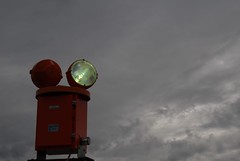Friday, 24 August 2007
Beacon from west Greenland
This week I joined an expedition of biogeochemists to Kangerlussuaq in west Greenland. As a soil and water biogeochemist, who focuses for most of my time of the nutrient cycling issues surrounding intensively managed agricultural systems, it is both necessary and exciting to build an understanding of the biogeochemistry of more pristine systems of the world. My objectives this week are to build an nutrient inventory for two remote and contrasting lake catchments, and specifically to test the hypothesis that lake catchments grazed by Musk Ox (introduced within the last centenary) have different nutrient cycling properties than the more extensive systems grazed only by reindeer. More fundamentally these systems present a unique contrast to the more commonly studied intensively managed systems of the world, and may help us understand fundamental processes of nitrogen, carbon and phosphorus cycling, and provide context for a true ‘reference’ condition as we seek ‘good ecological status’ as part of the goals of the catchments in the EU Water Framework directive. On the expedition I am working with some terrific scientists from the UK and US, led inimitably by John Anderson from Loughborough (John is a lake expert who has been studying the west Greenland lakes for 15 years). We stayed both at the Kangerlussuaq International Science Support (KISS) centre and in tents and a selection of the photos from the week’s activities are available here Phil
Subscribe to:
Post Comments (Atom)

No comments:
Post a Comment